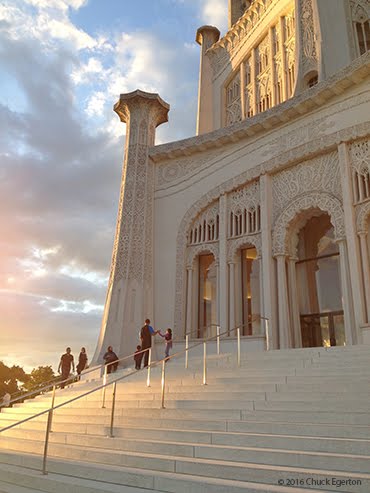Friday, July 3, 2015
"Man is ... at the end of imperfection and the beginning of perfection. ..."
"Man is in the ultimate degree of materiality and the beginning of spirituality; that is, he is at the end of imperfection and the beginning of perfection. He is at the furthermost degree of darkness and the beginning of the light. That is why the station of man is said to be the end of night and the beginning of day, meaning that he encompasses all the degrees of imperfection and that he potentially possesses all the degrees of perfection. He has both an animal side and an angelic side, and the role of the educator is to so train human souls that the angelic side may overcome the animal. ..."
‘Abdu’l-Bahá, Some Answered Questions
Thursday, July 2, 2015
"Know that nothing that exists remains in a state of repose—that is, all things are in motion."

"KNOW THAT NOTHING that exists remains in a state of repose—that is, all things are in motion. They are either growing or declining, either coming from non-existence into existence or passing from existence into non-existence. So this flower, this hyacinth, was for a time coming from non-existence into existence and is now passing from existence into non-existence. This is called essential or natural motion, and it can in no wise be dissociated from created things, for it is one of their essential requirements, just as it is an essential requirement of fire to burn."
‘Abdu’l-Bahá, Some Answered Questions
Wednesday, July 1, 2015
" ... that this lump of coal may become a diamond and this barren tree may be grafted and yield fruit .."

"This is the wisdom of the appearance of the Prophets: to educate humanity, that this lump of coal may become a diamond and this barren tree may be grafted and yield fruit of the utmost sweetness and delicacy. And after the noblest stations in the world of humanity have been attained, further progress can be made only in the degrees of perfection, not in station, for the degrees are finite but the divine perfections are infinite."
‘Abdu’l-Bahá, Some Answered Questions
Tuesday, June 30, 2015
" ... good deeds alone, without the recognition of God, cannot lead to eternal redemption ..."

"QUESTION: IT IS said in the Kitáb-i-Aqdas: “…whoso is deprived thereof, hath gone astray, though he be the author of every righteous deed”. What is the meaning of this verse?
... This blessed verse means, therefore, that good deeds alone, without the recognition of God, cannot lead to eternal redemption, to everlasting success and salvation, and to admittance into the Kingdom of God."
‘Abdu’l-Bahá, Some Answered Questions
Monday, June 29, 2015
" ... the connection of the spirit with the body is even as the connection of this lamp with a mirror."

"... No, the connection of the spirit with the body is even as the connection of this lamp with a mirror. If the mirror is polished and perfected, the light of the lamp appears therein, and if the mirror is broken or covered with dust, the light remains concealed."
‘Abdu’l-Bahá, Some Answered Questions
Library of Congress
Sunday, June 28, 2015
"The truth, however, is that the rational soul is the substance through which the body subsists."

"... Some hold that the body is the substance and that it subsists by itself, and that the spirit is an accident which subsists through the substance of the body. The truth, however, is that the rational soul is the substance through which the body subsists. If the accident—the body—is destroyed, the substance—the spirit—remains."
‘Abdu’l-Bahá, Some Answered Questions
Saturday, June 27, 2015
" ... Time and place encompass the body, not the mind and the soul."

" ... The Kingdom is outwardly referred to as “heaven”, but this is an expression and likeness and not a factual statement or reality. For the Kingdom is not a material location but is sanctified above time and place. It is a spiritual realm, a divine world, and it is the seat of the sovereignty of the almighty Lord. It is exalted above bodies and all that is corporeal, and it is freed and sanctified from the idle conjectures of men. For to be confined to place is a characteristic of bodies and not of spirits: Time and place encompass the body, not the mind and the soul."
‘Abdu’l-Bahá, Some Answered Questions
Durer
Subscribe to:
Posts (Atom)



